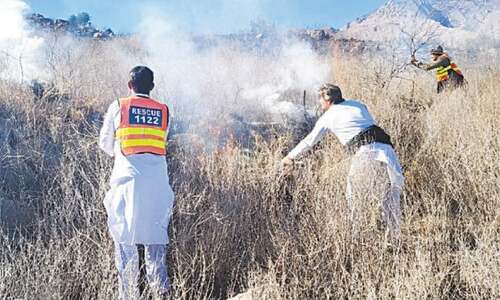As the United Nations International Day in Support of Victims of Torture was observed across the world on June 26 (Sunday), the Human Rights Commission of Pakistan (HRCP) called upon the parliament to criminalise torture in accordance with the UN Convention against Torture (CAT) and other cruel, inhuman or degrading treatment or punishment.
The HRCP organised a consultation a few days ago in Lahore for reviewing the State’s compliance with the Convention against Torture, which Pakistan has signed in 2010. The consultation put forward several recommendations for the government, Parliament and civil society.
The UN International Day in Support of Victims of Torture commemorates the signing of the UN Charter on June 26, 1946 and the entry into force of CAT the same day in 1987. This convention was adopted and opened for signature and ratification by the General Assembly on Dec 10, 1984.
The Government of Pakistan signed the convention on April 17, 2008 and ratified it on June 23, 2010. An Optional Protocol to CAT was also adopted by the General Assembly on Dec 18, 2002 and it entered into force on June 22, 2006. The Government of Pakistan has so far not signed or ratified the optional protocol.
After the passage of six years since the government ratified the convention, so far it could not enact a law for exclusively dealing with torture cases and to provide for a mechanism to compensate the torture victims and survivors. A proposed law, Torture and Custodial Death (Punishment) Act, has still been in the pipeline. While the Senate of Pakistan passed the Torture and Custodial Death (Punishment) Bill, 2014, in March 2015 the National Assembly has so far not passed the same.
The HRCP has recommended to the government to hold public debate on the draft bill. It also called upon the federal government to provide training and access to modern and scientific methods of investigations to law enforcement agencies and the judiciary and shift away from inhumane methods of investigation and extraction of confessions.
The consultation asked the government to ratify the Optional Protocol to CAT and to establish an independent body that investigates and prosecutes police officers accused of torture and other forms of ill-treatment.
The proposed anti-torture law provides that the government shall constitute a National Crime Control Agency for the purpose of investigating crimes committed under this proposed law.
For the offence of torture the proposed law envisages sentence of up to seven years rigorous imprisonment with maximum fine of up to Rs5 million.
It includes a comprehensive definition of torture. In the proposed law torture means “any act or omission which causes pain, whether physical or mental, to any person; and being in every case, an act that is done by or at the instigation of, or with the consent or acquiescence of, a public servant or any person acting on his behalf, for such purposes as: obtaining from that person or some other person information or a confession; or punishing that person for any act or omission for which that person or some other person is responsible or is suspected of being responsible; or intimidating or coercing that person or some other person; or for any reason based on discrimination of any kind.”
Furthermore, torture shall include any act, omission or commission in respect of a woman or child where such act harms or injures or endangers the health, safety, life, limb or wellbeing, whether mental or physical, of a woman or tends to do so and includes causing physical abuse, sexual abuse, verbal and emotional abuse; or harasses, harms, injures or endangers a woman.
The Constitution of Pakistan prohibits torture in custody. Article 14 (2) of the Constitution states: “No person shall be subjected to torture for the purpose of extracting evidence.” The Pakistan Penal Code (PPC) also prohibits causing of hurt for extracting confession and this offence is punishable up to 10 years imprisonment. But no law in Pakistan defines torture.
Section 337-K of the PPC states: “Whoever causes hurt for the purpose of extorting from the sufferer or any person interested in the sufferer, any confession or any information which may lead to the detection of any offence or misconduct, or for the purpose of constraining the sufferer, or any person interested in the sufferer, to restore, or to cause the restoration of, any property or valuable security or to satisfy any claim or demand, or to give information which may lead to the restoration of any property, or valuable security shall, in addition to the punishment of qisas, arsh or daman, as the case may be, provided for the kind of hurt caused, be punished, having regard to the nature of the hurt caused, with imprisonment of either description for a term which may extend to ten years as ta’zir.”
Furthermore, the Police Order2002 includes Section 156 (d) stating that whoever, being a police officer, inflicts torture or violence on any person in his custody shall on conviction be punished with imprisonment for a term, which may extend up to five years and with fine.
Contrary to this constitutional guarantee custodial torture by the law enforcing agencies is now an undeniable fact. During last over a decade, with the rise in militancy, the situation has deteriorated especially when armed forces were called for curbing militancy in several conflict zones.
Under the Code of Criminal Procedure a suspect could be remanded into custody of police for 15 days. Section 167 of the CrPC permits a magistrate to remand an accused person into custody of police for maximum of 15 days. Similarly, section 21 E of the Anti-Terrorism Act 1997 empowers the anti-terrorism court to remand a person detained for investigation to custody for maximum 15 days, but in case the investigation officer proves that further evidence may be available the court may remand the suspect for maximum 30 days in custody.
With the enactment of the Protection of Pakistan Act 2014 an accused could be remanded for 60 days. Section 5 (4) states that a special magistrate may remand the accused, from time to time, in such custody as such magistrate thinks fit for a term not exceeding 60 days. However, the magistrate shall not remand an accused person to custody for a more than 15 days at a time.
Legal experts believe that the government should make efforts for early enactment of the proposed law in line with CAT and should also ratify the Optional Protocol to the convention. Moreover, they believe that the issue of payment of compensation to the torture victims should also be clearly mentioned in the law to be enacted by the Parliament.
Published in Dawn, June 27th, 2016













































Dear visitor, the comments section is undergoing an overhaul and will return soon.